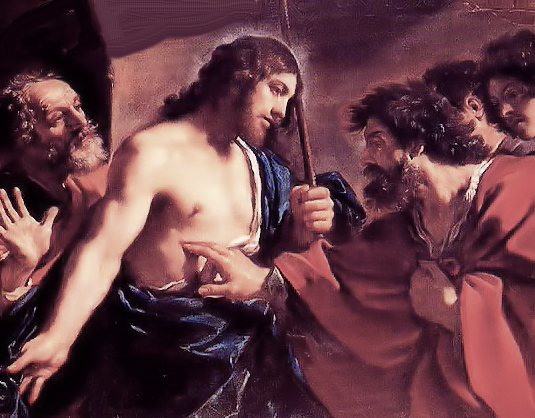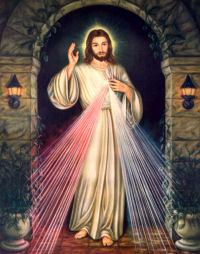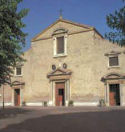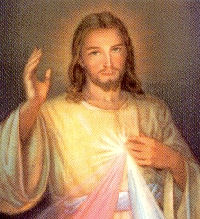Easter: April 24th
Second Sunday of Easter (or Sunday of Divine Mercy)
Other Titles: Low Sunday; Domenica in albis; Quasimodo Sunday
» Enjoy our Liturgical Seasons series of e-books!
Gospel Verse, Jn 20:29:
You believe in me, Thomas, because you have seen me, says the Lord; blessed are they who have not seen me, but till believe!
"I shall sing forever the Lord's mercy." (Ps 89 [88]) This Sunday is popularly known as Mercy of God Sunday. Between 1930 and 1938 Christ appeared to Sister Faustina, a Sister of Mercy in Poland who initiated the Divine Mercy devotion. She was canonized on April 30, 2000, the Sunday after Easter, the Feast of Divine Mercy. On Good Friday, 1937, Jesus requested that Blessed Faustina make a special novena before the Feast of Mercy, from Good Friday through the following Saturday. Jesus also asked that a picture be painted according to the vision of Himself as the fountain of mercy. He gave her a chaplet to be recited and said that it was appropriate to pray the chaplet at three o'clock each afternoon (the Hour of Great Mercy).
The Optional Memorial of St. Fidelis of Sigmaringen ordinarily celebrated today, is superseded by the Easter liturgy.
Meditation—Second Sunday of Easter or Divine Mercy Sunday
The Holy Gospel that the Liturgy presents to us on this second Sunday of Easter, is one of the most well known, discussed, and appreciated—the meeting of the Risen Lord with St Thomas. The Fathers of the Church have given us numerous insights into this Gospel text. Likewise, it is has proven the inspiration to the numerous artists who have physically represented the events of this Gospel in order to give us a clear idea of what happened, ‘eight days after’ the first apparition of the Risen One, to the disciples congregated in the cenacle.
Jesus’ response to Thomas, after he recognized Him as ‘My Lord and my God’, has a mysterious fascination that must relate not so much to the disciples—those who ‘have seen’—but rather to those, like us, who were added to their number afterwards. ‘You have come to believe because you have seen me. Blessed are those who have not seen and have believed.’ (Jn 20:29)
The attention that these words evoke seams yet more paradoxical if we remember that the Lord had proposed, to the same author of the Gospel, what can be justly referred to as the Christian method, ‘come and see’ (Jn 1:39). How can we possibly reconcile these two phrases by Jesus that form the ideal setting for the whole of the fourth Gospel?Perhaps, in the end, the Lord decided to change His method? What do the words ‘have not seen’ really mean?
The timely recollection of the ‘eight days after,’ which is the Sunday after the Resurrection, permits us to tie our reflection to one of the most significant Eucharistic hymns composed by another Thomas, St Thomas Aquinas. In the Adore Te Devote, which refers to the Eucharist, we read: ‘Sight, touch, taste are all deceived in their judgement of you. But hearing suffices firmly to believe’. Combining these words with today’s Gospel we can justly affirm that the experience ‘to see’ was not denied to us, but it is in contrast with the Apostle Thomas’ physical experience, who was able to put his own finger into the holes in Christ’s hands and side, whilst we can only comprehend it in the faith which is guarded and transmitted by the Church, our Mother and Teacher.
That which we ‘have not seen’ is therefore the glorious Body of the Risen One. However, today we have the ability to ‘listen’ to the Word of God and the Magisterium of the Church and so we can ‘see’ the real Body of Christ which is the Eucharist. We can ‘see’His Mystical Body which is the Church. We can ‘see’ Him in our lives and in the lives of our many brothers who, after meeting the Lord in a real but mysterious way, are united to Him in His Spirit!
Like Thomas, Christ calls us to fill the holes left by the instruments of the passion in His Body with our own hands so that our lives and the verbal witness that we give proclaim His Resurrection. Our senses could betray us, but we know that we have met the Risen One and we have recognized Him!
The certain hope that Peter, who betrayed the Lord three times for fear of death, proclaims to us with the words, ‘rejoice with an indescribable and glorious joy’ (1 Peter 1:8), become fully comprehensible because blessed are they that ‘have not seen’ the Risen Lord, but seeing the joy of His disciples ‘have believed’ in Him!
—From the Congregation for the Clergy
Sunday Mass Readings for Year C:
The First Reading is Acts 5:12-16. In a few plain and simple sentences, St. Luke, who wrote the Acts, gives us a bird's eye view of the young Christian community in Jerusalem. Their firm belief was that the Christ, whom the leaders of the Jews had crucified unjustly, had been raised by the Father from the dead, and was now in glory at the Father's right hand in heaven. "The breaking of bread" in common, the Holy Eucharist, the means Christ had planned and instituted before his death, of remaining with them on earth, was the other great bond of unity and strength which made them a compact community, distinct from their fellow Jews who refused to believe.
As yet they had no plans as to how the good news of God's intervention in the eternal destiny of man was to be brought to the world. They humbly and patiently waited for inspiration from the Holy Spirit whose direction and assistance Christ had promised them (Acts 1:4-7). This came in due time and the Apostles and their followers did their part nobly when called upon, as the later chapters of Acts show.
What must strike any reader of the story of the disciples' relationship with Christ before and after his resurrection, is the infinite power of God's grace on the minds of men. We must remember that Jesus of Nazareth lived, preached and died as a mere man in the eyes not only of his chosen Apostles. That he had the power of miracles from God they knew. That he would use this power to prevent his enemies capturing and condemning him to death must have been their firm conviction up to Holy Thursday night. What they did not know or grasp, until the resurrection, was that he was the true Son of God, even though he had given many hints of it. His divinity was hidden so that as the one true man acting as representative of the human race he could carry out the divine plan, giving absolute obedience to the will of the Father, even though that led him to the death of the. cross. By doing this he earned for all men, of all time, the title of adopted sons of God and heirs of heaven.
Once the Apostles grasped the fact of the resurrection they recognized, in the beloved Master whom they had followed for three years, the One he truly was. They recognized in him the God-man—the man who had drained the cup of human sufferings to its bitter end, and the hidden God who allowed his divinity to appear again only when he had completed the task his Father had given him to do. St. Peter on the day of Pentecost expressed this new faith of the Apostles briefly but effectively: " Let the whole house of Israel know that God (the Father) has made this Jesus whom you crucified both Lord (God) and Christ (the promised Messiah)." The resurrection, in other words, proved that Christ the Messiah was God as well as man.
The resurrection, for us too, is the solid foundation of our Christian faith. We are followers of Christ who was God and man. His life's work on earth was on our behalf, to earn heaven for us. He has taught us how to get there. If we follow him we cannot go astray. He has guaranteed us all the necessary graces and helps that we need on the road, and we have but to accept them. His rising from the tomb was the key to open all human tombs and graves. We too shall rise like him with glorified bodies, free from all earthly ills, ready to enjoy an everlasting heaven, if we clutch that key to our hearts. It is the key of faith in Christ, of hope in his divine promise, and of love for the God who has so lovingly planned and prepared a home of eternal happiness for us.
The Second Reading is Revelation 1: 9-13; 17-19. These inspired words of John, read to us today, are intended to inspire us with still greater love and gratitude to the Risen Savior, who has earned for us a new life of glory and happiness beyond the grave, if we remain faithful to our Christian faith during the few short years of our earthly life.
The death and resurrection of Christ have taken the sting out of death for all true believers in Christ. As St. Paul says, referring to our resurrection: " When our mortal body puts on immortality, then shall come to pass the word that is written . . .O death where is your victory? O death where is your sting?" (1 Cor. 15: 54). So no truly believing Christian should really worry about death or grieve for those who have gone. This does not mean that we must not care for our health, or that we can afford to be reckless and foolish in our mode of living. Each one of us has a certain number of years allotted to him in which he is to carry out God's will on this earth. We are not doing God's will if we shorten that term through our own fault. Not only is suicide sinful; so also is wilful abuse of health, which shortens one's life.
It is often said that death is the one and only future event in our lives of which we can be absolutely certain. But for the sincere Christian, that is for the one who is honestly, if fumblingly, trying to live each day in the love of God, there is a second certainty and it is: that death will open the door into the halls of heaven. Instead of being something to dread and fear it is the necessary prelude to our perfect joy and happiness.
If there really are people who have convinced themselves rationally that there is no such person as God, and no life after death, they must have every reason to fear death and to dread the very thought of it. They have to leave everything and everyone they know and love—and leave them forever. The grave is indeed the end for them, if their strange philosophy is true. For us Christians and for all others who believe in God and life after death, that is, for the vast majority of mankind, death is rather the beginning of our real existence. We know that it separates us from our loved ones but only for a short space of time. Even this is not a real separation, for we are still members of Christ's body and can intercede for and help those loved ones we leave behind.
Christ has the keys of death and of the underworld—he has given those keys to us in the sacraments and all the other aids he has left us in his Church. If any Christian fails to rise glorified from his grave he must have foolishly thrown away the keys or refused to learn how to use them. Such Christians, thank God, are few and far between. I have no intention of increasing their number by being among them.
The Gospel is John 20:19-31, doubting St. Thomas. It may surprise and amaze us that the Apostles were so reluctant to believe that Christ had risen from the dead, to live forever in glory with his Father in heaven. But we must remember that during their two or three years with him they saw nothing in him but a mere man, one with divine powers, but yet a man; certain prophets of the Old Covenant had some such powers also. Christ had "emptied himself of his divine nature, and he had foretold his resurrection many times. But that he could be really God, as well as man, was something they could not then grasp, and if he was a mere man death had to be the end.
Their slowness of faith had its value for the future Church and for all of us. If they had been expecting the resurrection, and anxiously looking forward to it, people could say that they imagined it, that they persuaded themselves it had happened. Indeed, there have been men proud of their acuteness of judgement, who have said that the story of the resurrection is a story of mass hallucination, although all the evidence proves the opposite. Their conviction that it could not happen, could not be removed from their minds except by impressive evidence that it had. Hallucination is born in a mind already expecting and hoping for the imagined fact.
We can thank the Apostles and especially Thomas, the last to give in, that our faith in the resurrection and divine glorification of Christ is that much the stronger. Our Christianity which would have ended before the first Easter week had passed, if Christ had not risen in glory, spread rapidly to the then known world and is still spreading, because its author was none other than Christ "our Lord and our God." How prophetic were the words of of Gamaliel at the meeting of the Sanhedrin which tried to prevent the Apostles from preaching the new Christian faith: "If this plan or work is of men, it will be overthrown; but if it is of God, you will not be able to overthrow it." (Acts 5: 38-39).
Second Sunday of Easter or Divine Mercy Sunday
 The Holy Gospel that the Liturgy presents to us on this second Sunday of Easter, is one of the most well known, discussed, and appreciated—the meeting of the Risen Lord with St Thomas. The Fathers of the Church have given us numerous insights into this Gospel text. Likewise, it is has proven the inspiration to the numerous artists who have physically represented the events of this Gospel in order to give us a clear idea of what happened, ‘eight days after’ the first apparition of the Risen One, to the disciples congregated in the cenacle.
The Holy Gospel that the Liturgy presents to us on this second Sunday of Easter, is one of the most well known, discussed, and appreciated—the meeting of the Risen Lord with St Thomas. The Fathers of the Church have given us numerous insights into this Gospel text. Likewise, it is has proven the inspiration to the numerous artists who have physically represented the events of this Gospel in order to give us a clear idea of what happened, ‘eight days after’ the first apparition of the Risen One, to the disciples congregated in the cenacle.
Jesus’ response to Thomas, after he recognized Him as ‘My Lord and my God’, has a mysterious fascination that must relate not so much to the disciples—those who ‘have seen’—but rather to those, like us, who were added to their number afterwards. ‘You have come to believe because you have seen me. Blessed are those who have not seen and have believed.’ (Jn 20:29)
The attention that these words evoke seems yet more paradoxical if we remember that the Lord had proposed, to the same author of the Gospel, what can be justly referred to as the Christian method, ‘come and see’ (Jn 1:39). How can we possibly reconcile these two phrases by Jesus that form the ideal setting for the whole of the fourth Gospel? Perhaps, in the end, the Lord decided to change His method? What do the words ‘have not seen’ really mean?
The timely recollection of the ‘eight days after,’ which is the Sunday after the Resurrection, permits us to tie our reflection to one of the most significant Eucharistic hymns composed by another Thomas, St Thomas Aquinas. In the Adore Te Devote, which refers to the Eucharist, we read: ‘Sight, touch, taste are all deceived in their judgement of you. But hearing suffices firmly to believe’. Combining these words with today’s Gospel we can justly affirm that the experience ‘to see’ was not denied to us, but it is in contrast with the Apostle Thomas’ physical experience, who was able to put his own finger into the holes in Christ’s hands and side, whilst we can only comprehend it in the faith which is guarded and transmitted by the Church, our Mother and Teacher.
That which we ‘have not seen’ is therefore the glorious Body of the Risen One. However, today we have the ability to ‘listen’ to the Word of God and the Magisterium of the Church and so we can ‘see’ the real Body of Christ which is the Eucharist. We can ‘see’ His Mystical Body which is the Church. We can ‘see’ Him in our lives and in the lives of our many brothers who, after meeting the Lord in a real but mysterious way, are united to Him in His Spirit!
Like Thomas, Christ calls us to fill the holes left by the instruments of the passion in His Body with our own hands so that our lives and the verbal witness that we give proclaim His Resurrection. Our senses could betray us, but we know that we have met the Risen One and we have recognized Him!
The certain hope that Peter, who betrayed the Lord three times for fear of death, proclaims to us with the words, ‘rejoice with an indescribable and glorious joy’ (1 Peter 1:8), become fully comprehensible because blessed are they that ‘have not seen’ the Risen Lord, but seeing the joy of His disciples ‘have believed’ in Him!
—From the Congregation for the Clergy
Jesus to Sr. Faustina
 On one occasion, I heard these words: "My daughter, tell the whole world about My inconceivable mercy. I desire that the Feast of Mercy be a refuge and shelter for all souls, and especially for poor sinners. On that day the very depths of My tender mercy are open. I pour out a whole ocean of graces upon those souls who approach the fount of My mercy. The soul that will go to Confession and receive Holy Communion shall obtain complete forgiveness of sins and punishment. On that day all the divine floodgates through which graces flow are opened. Let no soul fear to draw near to Me, even though its sins be as scarlet. My mercy is so great that no mind, be it of man or of angel, will be able to fathom it throughout all eternity. Everything that exists has come forth from the very depths of My most tender mercy. Every soul in its relation to Me will contemplate My love and mercy throughout eternity. The Feast of Mercy emerged from My very depths of tenderness. It is My desire that it be solemnly celebrated on the first Sunday after Easter. Mankind will not have peace until it turns to the Fount of My Mercy.
On one occasion, I heard these words: "My daughter, tell the whole world about My inconceivable mercy. I desire that the Feast of Mercy be a refuge and shelter for all souls, and especially for poor sinners. On that day the very depths of My tender mercy are open. I pour out a whole ocean of graces upon those souls who approach the fount of My mercy. The soul that will go to Confession and receive Holy Communion shall obtain complete forgiveness of sins and punishment. On that day all the divine floodgates through which graces flow are opened. Let no soul fear to draw near to Me, even though its sins be as scarlet. My mercy is so great that no mind, be it of man or of angel, will be able to fathom it throughout all eternity. Everything that exists has come forth from the very depths of My most tender mercy. Every soul in its relation to Me will contemplate My love and mercy throughout eternity. The Feast of Mercy emerged from My very depths of tenderness. It is My desire that it be solemnly celebrated on the first Sunday after Easter. Mankind will not have peace until it turns to the Fount of My Mercy.
"[Let] the greatest sinners place their trust in My mercy. They have the right before others to trust in the abyss of My mercy. My daughter, write about My mercy towards tormented souls. Souls that make an appeal to My mercy delight Me. To such souls I grant even more graces than they ask. I cannot punish even the greatest sinner if he makes an appeal to My compassion, but on the contrary, I justify him in My unfathomable and inscrutable mercy. Write: before I come as a just Judge, I first open wide the door of My mercy. He who refuses to pass through the door of My mercy must pass through the door of My justice.
"From all My wounds, like from streams, mercy flows for souls, but the wound in My Heart is the fountain of unfathomable mercy. From this fountain spring all graces for souls. The flames of compassion burn Me. I desire greatly to pour them out upon souls. Speak to the whole world about My mercy."
—Excerpted from Diary of Sr. M. Faustina Kowalska
Highlights and Things to Do:
- Read the Apostolic Peniteniary Decree on the Indulgences attached to devotions in honour of Divine Mercy.
- Read Dives in Misericordia (Rich in Mercy), the encyclical Letter of John Paul II on Mercy.
- On Good Friday, 1937, Jesus requested that St. Faustina make a special Divine Mercy Novena before the Feast of Mercy, from Good Friday through the following Saturday. Jesus also asked that a picture be painted according to the vision of Himself as the fountain of mercy. He gave her a Chaplet of Divine Mercy to be recited and said that it was appropriate to pray the chaplet at three o'clock each afternoon (the Hour of Great Mercy).
- See Catholic Cuisine for some inspirational food ideas for this Feast of Divine Mercy.

Second Sunday of Easter (or Sunday of Divine Mercy)
Station with San Pancrazio (St. Pancras):
The last stational procession is held at the Church of St. Pancras. Those newly baptized are now full fledged members of the Christian community. This church is most appropriate since St. Pancras was a young man of fourteen who sealed his baptismal promises with his blood.
For more on San Pancrazio, see:
For further information on the Station Churches, see The Stational Church.






